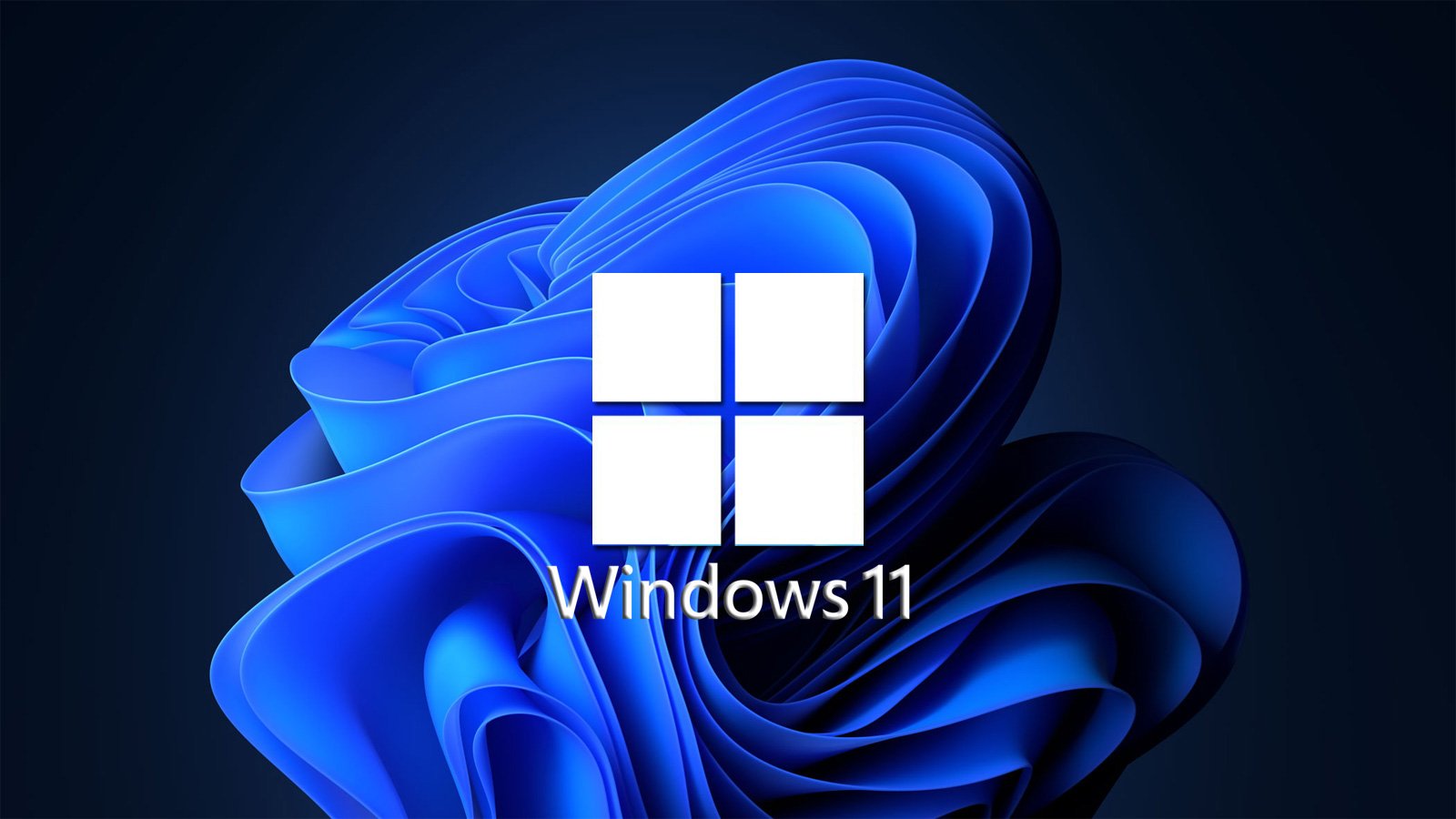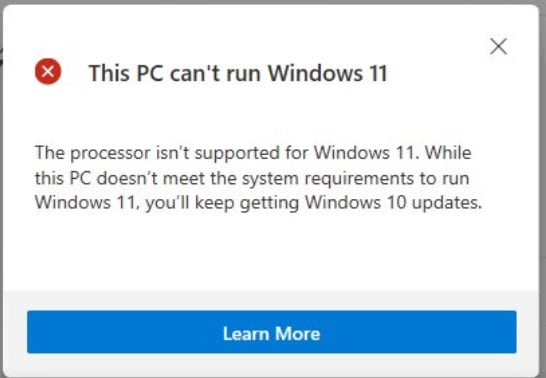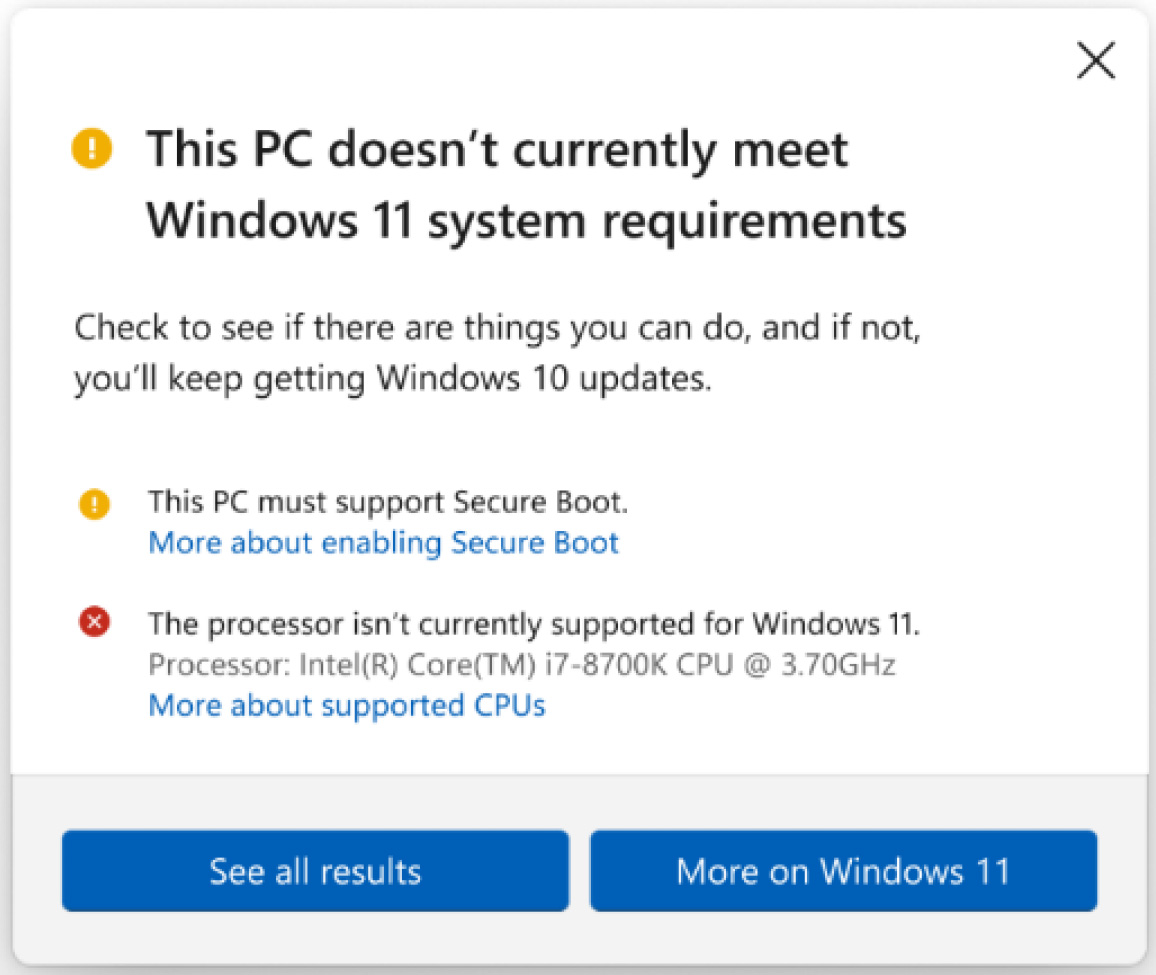
Microsoft announced today that after investigating other potentially compatible processors for Windows 11, they only found one 7th generation Intel CPU to be compatible, and no first generation AMD Zen CPUs.
When Microsoft first announced Windows 11, many users were upset, if not angry, about the new and stricter system requirements for the new operating system.
With the new TPM 2.0 requirement and a restricted list of compatible CPUs, many people found that their devices with Intel 7th generation and first generation AMD Zen CPUs, which run Windows 10 flawlessly, can no longer upgrade to Windows 11.
To make matters worse, Microsoft released a new tool called PC Health Check that first checks if your hardware is compatible with Windows 11. However, this tool was severely lacking as it provided little information as to why a device was not compatible, as shown below.

Additional Windows 11 compatible CPUs
Microsoft announced today that they had expanded their list of compatible 64-bit processors to include one Intel 7th generation CPU and newer Intel Core CPUs:
- Intel Core X-series, Xeon W-series
- Intel Core 7820HQ (only select devices that shipped with modern drivers based on Declarative, Componentized, Hardware Support Apps (DCH) design principles, this includes Surface Studio 2)
Microsoft uses the Intel Core i7-7820HQ processor in their $3,500 Surface Studio 2 devices, so it is not surprising to see that this CPU found its way into the compatibility list.
According to Microsoft, these additional CPUs were added as they follow Microsoft's DCH design principles:
Declarative (D): Install the driver by using only declarative INF directives. Don't include co-installers or RegisterDll functions.
Componentized (C): Edition-specific, OEM-specific, and optional customizations to the driver are separate from the base driver package. As a result, the base driver, which provides only core device functionality, can be targeted, flighted, and serviced independently from the customizations.
Hardware Support App (H): Any user interface (UI) component associated with a Windows Driver must be packaged as a Hardware Support App (HSA) or preinstalled on the OEM device. An HSA is an optional device-specific app that's paired with a driver. The application can be a Universal Windows Platform (UWP) or Desktop Bridge app. You must distribute and update an HSA through the Microsoft Store. For details, see Hardware Support App (HSA): Steps for driver developers and Hardware Support App (HSA): Steps for app developers.
Microsoft says that CPUs who following the DCH design principles have a 99.8% kernel crash-free experience.
"Devices that do not meet the minimum system requirements had 52% more kernel mode crashes. While devices that do meet the minimum system requirements had a 99.8% crash free experience," explained Microsoft in today's blog post.
Unfortunately, no other Intel 7th generation CPUs are compatible with Windows 11. Furthermore, after working with AMD to analyze first-generation AMD Zen CPUs, Microsoft determined that none of them were compatible with Windows 11.
Updated PC Health Check tool released soon
In addition to the minor change in CPU compatibility, Microsoft has released a new version of their PC Health Check tool that provides more detailed information regarding why a device is not compatible with Windows 11.
With the new version, users will get detailed explanations as to what is missing to make their device compatible with Windows 11, as shown below.

While users cannot resolve an incompatible CPU without buying another processor, other items like Secure Boot or a missing TPM 2.0 processor, can in many cases, be fixed by enabling settings in the BIOS.









Comments
TheJokerz - 3 years ago
I am unable to download the new tool, it just says coming soon..
Windows10User - 3 years ago
You need to be a Windows Insider to download it
TheJokerz - 3 years ago
Cool thanks for the info!
Delivon - 3 years ago
Ok, so I have 3 computers running windows 11 right now 1 for work, i5-6500T, 4gb of ram and a 500gb SSD, and a couple personal systems, i3-6100, 4gb of ram and a 240gb SSD along with a Ryzen 5 5800x, 32gb of ram and a 1tb SSD, which had a Ryzen 7 2700x before that, which work with windows 11 so I'm unsure why it says no Ryzen CPUs are supported when I have had both 2nd gen and 5th gen Ryzen working successfully along with 6th gen intel CPUs.
I'm very curious as to why its only Intel that are fully supported yet AMD is getting shafted.
gphill4 - 3 years ago
Unless I'm misinterpreting something, I believe that the only Ryzen Microsoft says isn't compatible is the original Ryzen (Zen), not other generations (Zen+, Zen2, Zen3).
AustinTexas787 - 3 years ago
You are correct...and therefore receive an upcheck on your basic reading skills. This article is out to lunch.
Lawrence Abrams - 3 years ago
Sorry, could have been clearer. We were referring to the first generation, which is just called 'Zen.'
Zen = 1st gen
Zen+ = 2nd gen
Zen 2 = 3rd generation
Zen 3 = 4th generation
...
None of the Zen (1st generation CPUs) will be supported by Windows 11. I have updated the article to make it clearer.
Windows10User - 3 years ago
6th gen isn't officially support, MS is just letting it happen right now to test "stability".
The only reason that I can think of why the one Intel 7th gen chip is supported is because MS is still selling the Surface Studio 2 which has that chip
ElliottOnBC - 3 years ago
Oops
Pointless_noise - 3 years ago
Yes they mean Zen 1. Zen 2 and onwards will be supported
"After carefully analyzing the first generation of AMD Zen processors in partnership with AMD, together we concluded that there are no additions to the supported CPU list."
I would assume this means all 1000 series Ryzen, all 1900 series threadripper, Ryzen 2200g and 2400g apu's and Naples series EYPC server processors, and Athlon 3000, 200ge, 220ge, and 240ge processors
AustinTexas787 - 3 years ago
How it it even possible to get an article this WRONG as regarding AMD Zen being supported by Windows 11? Is this Intel fanboy-ism set to kill?
Reality: Of course Windows 11 covers AMD Zen...all except it's oldest iteration, Zen 1. We're now on Zen 9, for heaven's sake.
Reference: See Microsoft's listing itself for "Windows 11 supported AMD processors"
Just preface the usual https ... through // to the following:
docs.microsoft.com/en-us/windows-hardware/design/minimum/supported/windows-11-supported-amd-processors
Spoiler alert: NO it does not say the magic (marketing) word "Zen" on the above listing. But anyone who knows anything about today's top desktop processors (yes...AMD!) will quickly recognize such listings as "3950X" and "5950X"...vastly etc. ... as being Zen 9, etc.
Yeesh.
edmoncu - 3 years ago
i would suppose this 7th gen laptop cpu works i5-7200U (Lenovo L580) where i am running Windows 11 now (upgraded from Windows 10).
DaRkHeArTz - 3 years ago
I like how they keep going on about DCH drivers when referring to the CPU, when I'm yet to see a specific driver released by Intel, AMD that is specifically for the CPU itself not for onboard graphics or chipset just the CPU entirely.
Every system I have ever seen under device manager the CPU driver are reported as Micro$oft drivers, not Intel or AMD purely Micro$oft. Now one would assume with Windows 10-11 that these drivers would be DCH compliant, otherwise what's the point in stating other manufactures have to stick to this damn standard if they can't.
Also if their drivers are DCH compliant for why do they not include @ the very least all 7th Gen CPU's that are compliant with there security standards & the like in their minimum requirements list.
You can't just state that 52% of Kernel crashes occur on older hardware, without first stating what that older hardware is, like what make model etc..
Pretty sure that the 7th gen CPU's that got recently included would have fallen into that class before there timely promotion to the minimum requirements list, not to mention a vast number of 7th gen CPU's have far superior security additions then the ones they included namely the Intel Core X-series. They most likely only got included because of their price tags $$$$ and/or were included in some outrages OEM's/SI builds.
Zaubermac - 3 years ago
This is a great example of manipulating data to support a weak argument.
It says non-DCH processors have 52% more crashes than DCH. It also states that DCH's have a 99.8% crash free experience. Doing the math...non-DCH have a 99.7% crash free experience.
Bottom line: We don't want to deal with your old stuff, we need the money, buy a new computer.
Did Apple buy Microsoft?
NoneRain - 3 years ago
I don't think your math is doing well...
Zaubermac - 3 years ago
So, I'll break it down. A 99.8% crash-free rate is .2% crash rate. 52% more crashes is a .3% crash rate or a 99.7% crash free experience.